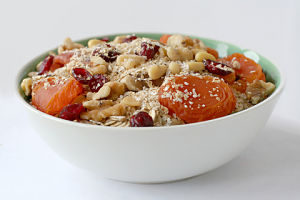Useful News from the Vital Signs Workshop
Five pioneering researchers with one critical message shared their knowledge at the Vital Signs workshop on April 10, 2010. This event, put together by the awesome nonprofit Physicians Committee for Responsible Medicine (PCRM) was packed with compelling new information in nutrition and health.

A food as simple and tasty as oatmeal with fruit, nuts, and dairy-free milk will set you strong on the road to health
Here are highlights of five useful tips from each of the five presenters. If you missed the workshop and want to learn more, PCRM has generously posted the slides.
Lawrence H. Kushi, Sc.D. summarized the findings of thousands of studies.
1. The American Cancer Society emphasizes whole plant foods (including five or more servings daily of fruits and vegetables), exercise, and a healthy weight to prevent cancer.
2. The World Cancer Research Fund/American Institute for Cancer Research report reinforces the importance of a varied whole foods, plant-based diet, physical activity, and lean weight in preventing and fighting cancer.
3. This report also recommends avoiding red meat, processed meat, alcohol, and salty foods.
4. Eating lots of fruits, vegetables, and whole grains helps prevent obesity and weight gain.
5. It’s silly to put meat and beans in the same food group. You are best off just eating the beans. We are moving in this direction as plant-based diets go mainstream.
Mark Messina, Ph.D., M.S., is the go-to person on soy, letting the audience know that this food is both safe and healthful. Dr. Messina cut to the essence of the more than 2,000 scientific papers published annually on soy. He recommends eating two to three servings of soy foods a day.
1. People in China and Japan have been consuming soy foods for thousands of years, with no associated issues with health or fertility.
2. Much of the confusion about soy centers on isoflavones, which are unique to soy foods. Isoflavones, which bind to estrogen receptors, have different effects in different parts of the body. These substances are generally health protective or neutral.
3. Soy protein lowers both cholesterol and the risk of heart disease. This food helps the inner walls of your arteries function better, especially if you already have cardiovascular disease.
4. Girls lucky enough to be raised with significant amounts of soy in their diets have a permanent, lifelong reduction in their risk of developing breast cancer. Adult women can safely enjoy soy, even if they have breast cancer, but do not get the same protective effect.
5. Popular myths and misconceptions about soy foods are rampant. For example, the truth is that soy has no effect on men’s testosterone levels. In fact, isoflavones may increase male fertility.
Neal Barnard, M.D., is the inspiring founder of PCRM and an expert in plant-based nutrition.

PCRM expands compassion in medicine by ending pointless dog labs. We stunt our compassion by confining it to only the human species.
1. People eating a plant-based diet enjoy permanent weight loss. The most effective approach is to abandon calorie restriction and focus instead on the kinds of foods you eat.
2. If you are diabetic and go on a whole foods, plant-based diet, keep your doctor’s phone number handy. Your health will improve so much that you will need to adjust your medications to avoid low blood sugar.
3. Dairy foods are a powerful trigger for joint pain.
4. Fat inside of muscle cells keeps insulin from doing its job of getting glucose into the cell. Glucose in the muscle cell’s fuel. Those on plant-based diets have less fat inside their muscle cells than meat-eaters do, independent of their overall weight.
5. Although it can take several weeks to adjust to, people who move up to a plant-based diet generally like it a lot. Dr. Barnard recommends a step approach to dietary change. First, try out new plant-based recipes or convenience foods and see what you like. Second, give the plant-based diet a three week test drive. It’s critical not to eat animal foods during this time so your tastes have time to change. Finally, link up with social support for your new diet. Many support groups are online, or find one in your community.
John McDougall, M.D., has been helping patients for decades, as well as sharing his knowledge in his books, DVDs, newsletter, and recipes. Watch for his upcoming book The Starch Solution.
1. Humans are designed to thrive on starch-based foods, including whole grains, beans, and potatoes. All large populations of trim, healthy people throughout verifiable human history have obtained the bulk of their calories from starches.
2. While bones can hold their form for thousands of years, bits of plant foods left over from the diet of early humans have long since decayed. However, recent technology allows researchers to determine the diet of early humans by analyzing their remains. These studies reveal that our earliest ancestors lived predominantly on plants.
3. Since the brain burns glucose, a starch-based diet was the foundation for the evolution of the large human brain.
4. Amylase, a major enzyme in saliva, is designed to start digesting the starch in your food as you chew it. Starch is clean fuel and plant diseases do not attack people.
5. Dr. McDougall is conducting an exciting, innovative study treating multiple sclerosis with diet.
Dean Ornish, M.D., has published in numerous prestigious medical journals, bringing plant-based diet treatment for cardiovascular disease and prostate cancer into the mainstream.
1. Focus on positive emotions as you motivate yourself and others to make healthier choices. Joy, freedom, and pleasure are sustainable emotions.
2. Avoid false choices, such as “would you rather live longer or have more fun.” You can live longer and have more fun at the same time.
3. Once you adopt a whole foods, plant-based diet you will start feeling and seeing results very quickly. This gratification will keep you motivated. The amount of dietary change determines your amount of improvement. How old or sick you were initially don’t matter.
4. Improved lifestyle for just three months improves how your genes are expressed. Any genes that might dispose you to cancer are turned down or turned off.
5. Practice eating as a form of meditation, and make sure to stay socially connected and build closeness to others.
Eat a whole foods, plant-based diet – that is the unifying critical message emerging from these powerful presentations. You can make a huge difference for yourself and others with this simple step. With so much strong evidence, isn’t it time to get moving on this joyful change?
Intrigued? Now you can use our Whole Foods Blog Finder to target informative, fun postings on plant-based nutrition. Quick information at no cost!
Blog by Janice Stanger, Ph.D. Janice authored The Perfect Formula Diet, a nutrition book built on sustainable food choices. Enjoy six kinds of whole foods for permanent, hunger-free weight loss and health.
Tags: Dr. Dean Ornish, Dr. John McDougall, Dr. Lawrence Kushi, Dr. Mark Messina, Dr. Neal Barnard, getting healthy, Janice Stanger, lose weight, nutrition facts, PCRM, Plant-based nutrition, process of change, vegetables, Vital Signs workshop, whole foods





After reading The China Study, by T. Colin Campbell which based his ~30 years of research in part on the way people ate in China, I learned that a major contributer to certain cancers is the CASEIN, the primary protein of milk.
Feeding the herbivore grass is very much not the same as feeding the cow corn, soy, cow blood, like is currently done in the factory farm system. The COW is much healthier on grass. This doesn’t change the fact that consuming bovine breast milk is still a poor choice for a human food, it still has Casein, hormones, rBGH?, pesticide residue?, casomorphin, and the ever appetizing somatic cell/white blood cell/pus, much higher in non-Organic milk, but still present.
For my body and my family I’m going with the science, not from one guy that writes a book: Weston Price.
Dairy is unnecessary!*
*Unless you are a calf